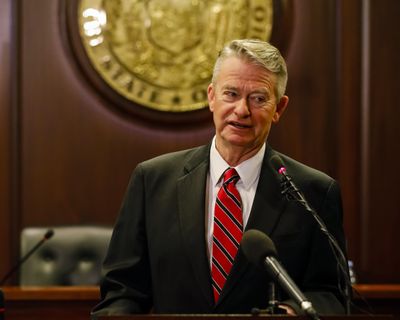Idaho lawmakers talk taxes, ballot initiatives and hemp

BOISE – Idaho Gov. Brad Little said Friday he’s already sent a message about making the state’s ballot initiative process tougher by vetoing a bill last year, but fellow Republican and House Speaker Scott Bedke said he’ll be surprised if new legislation isn’t introduced this year.
Little, Bedke and other leaders took part Friday in the Associated Press Legislative Preview.
Bedke said if citizens are going to act as a legislative body, then the laws they propose should have a statement of purpose and a fiscal impact process.
“This is not about making it, quote, harder,” he said. “This is about when it gets here, it has to fit.“
Democratic House Minority Leader Ilana Rubel said the ballot initiative process is fine as is.
“We have an incredibly hard initiative process,” she said. “I think we just ought to leave it alone.”
Lawmakers said they expect property, local option and grocery taxes to also be among the topics of the legislative session that starts Monday.
Some local governments have said allowing them to create local option taxes could relieve some of their budget problems. Residential property taxes have been rising rapidly as new residents arrive and home values rise, forcing some longtime residents from their homes.
“Quite frankly, as you look at some sister states, we do have a higher percentage of our property tax burden paid by homeowners than by commercial as a percentage,” Senate President Pro-Tem Brent Hill said.
Democratic Senate Minority Leader Michelle Stennett cautioned about potential tax cuts following a $225 million reduction passed by Republican lawmakers in 2018, which was described as one of the largest tax cuts in state history. Little in November asked state agencies to trim their budgets by 1% and prepare for more cuts this year.
“I’m not sure if it’s timely to be doing tax cuts,” said Stennett, but conceded tax cuts are popular in an election year.
Additional legislation will almost certainly include the potential legalization of hemp. Little said he could support a proposal if it doesn’t make it more difficult for police to enforce marijuana laws.
Education funding, which accounts for about half of the state’s budget, will take up considerable debate, and a funding formula aimed at revamping the entire system, which stalled last year, could return.
How to pay for voter-approved Medicaid expansion, which passed with an initiative in 2018 after years of inaction by the Republican-dominated Legislature, also will be debated. Nearly 55,000 low-income residents have signed up for coverage.
Idaho’s obscure administrative rules process could be revamped after Republicans in the House and Senate last year failed to pass legislation authorizing thousands of regulations.
That gave Little sweeping authority to eliminate regulations without public or lawmaker oversight. In his first year in office, Little boasted he cut or simplified 75% of Idaho’s administrative rules adding up to 30,000 restrictions and some 1,800 pages of regulations. The rules include such things as protecting consumers, homeowners, the environment and school children.
Hill and Bedke said the Senate and House have been negotiating, and legislation revamping the entire system could be introduced. Currently, either chamber can approve a rule. The House is insisting that approval from both chambers is necessary. But the Senate has balked at giving the House unilateral authority to kill rules.
This year, lawmakers will have to consider each of the rules they failed to previously authorize, plus new administrative rules put forward by state agencies. But Hill didn’t see a big problem.
Paying to house inmates is turning into a big expense; the state also pays to house hundreds of prisoners in Texas because Idaho doesn’t have the space.
Legislation aimed at not incarcerating people for lower-level crimes failed last year.
“We cannot continue to be the highest incarcerator in the West,” she said. “There are so many things in our code that need fixing.”
Bedke said part of the large prison population was a reflection of Idaho’s growth.
“You’ve got to have increased capacity,” he said. “Is that an admission of failure? I don’t think it is.”